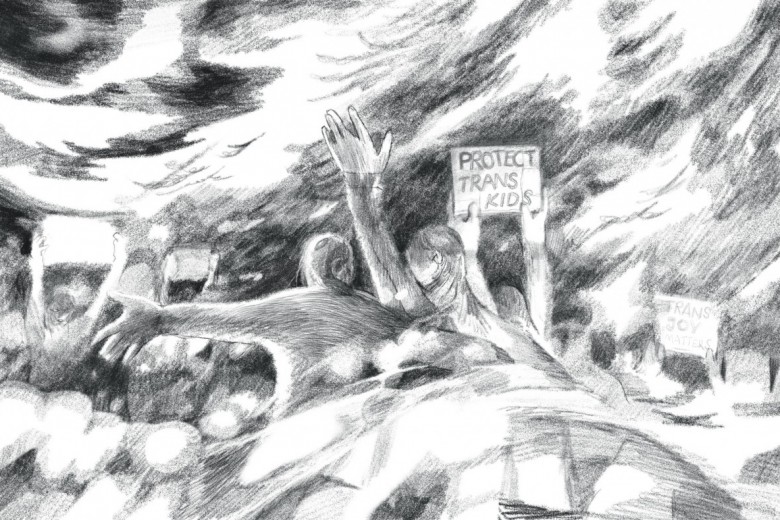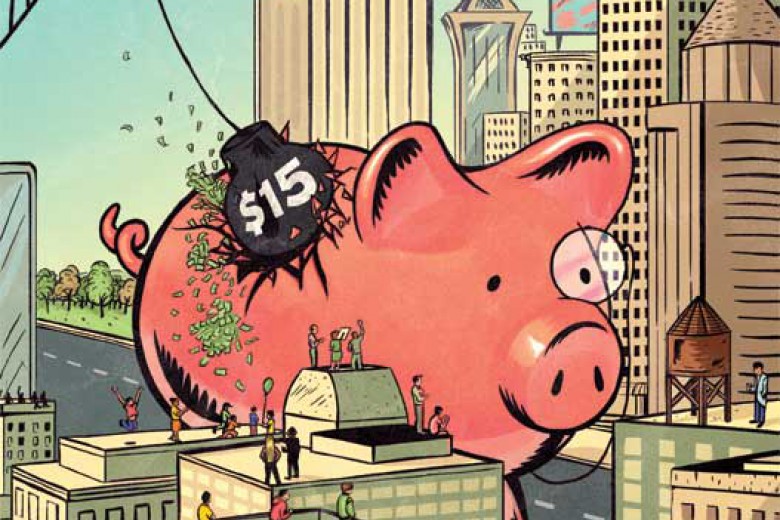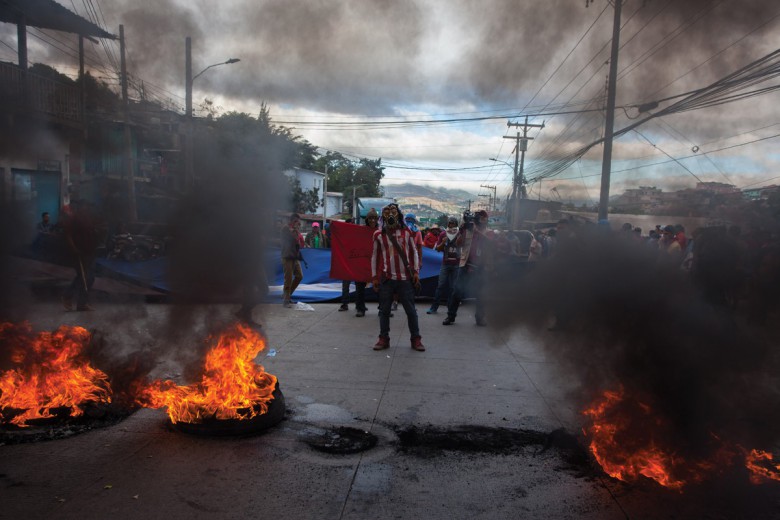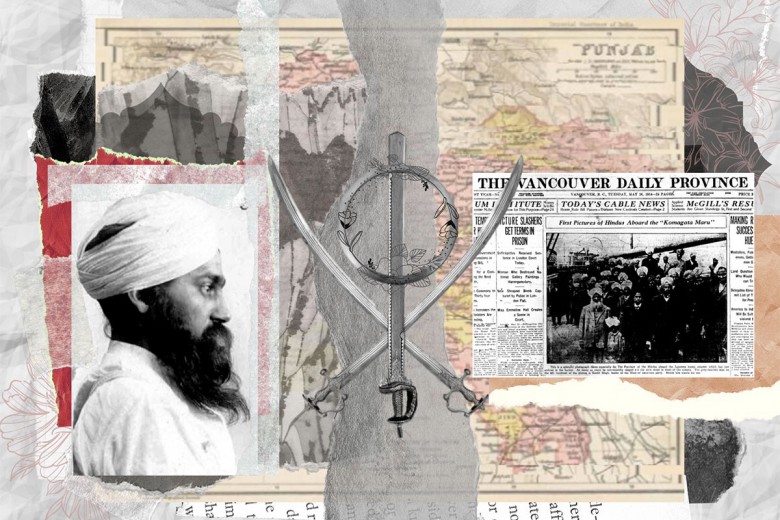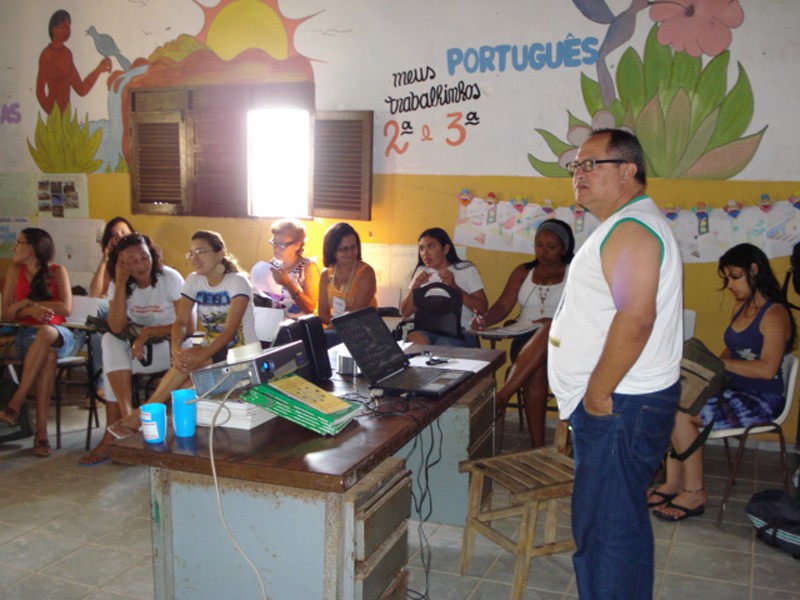
“Our action is our spirituality. It’s my faith that makes me fight.” When Rubens Pita said this, nearly everyone in the room spoke up to offer their own reflections.
“Faith responds to the action of politics” said one woman in the circle.
“Prayer is reflecting, but also acting. Otherwise, prayer is just repeating words” said another.
Rubens is an educator and coordinator at the Escola Fé e Política: Pe. Humberto Plummen (School of Faith and Politics) in Recife, Brazil. The school is one of five Escolas Fé e Política in Brazil that use experiential learning to raise the social and political awareness of the nation’s people.
Liberation Theology
Founded in 2004, the Escola’s pedagogy is rooted in a grassroots mass movement known as Liberation Theology. Beneath the dictatorships that ruled much of Latin America in the 1960s and ’70s, oppressed and marginalized communities reinterpreted stories in the Bible as practical lessons on non-violent resistance, just governance and, above all, examples of the interdependent pursuits of social and spiritual liberation. Once picked up by bishops and theologians, the movement developed into a powerful resistance to government oppression. At the heart of Liberation Theology is the “preferential option for the poor” which depicts Jesus as a revolutionary who stood in solidarity with the poor and oppressed.
The Liberation Theology movement organized and amplified the voices of poor Latin Americans and provided a platform from which they could fight for their rights. Under the oppression of serial dictatorships, the church was one of the very few places where people had the freedom to speak out. It became the common ground for mass mobilization in the pursuit of social justice, which from the perspective of Liberation Theology demands freedom from political oppression alongside liberation from personal sins like greed and selfishness.
In the 1980s, the Vatican began to suppress the movement and expel radical bishops and priests. In Brazil, when the hierarchical backlash from the Church coincided with the opening of democracy in 1985, many of the leaders of Liberation Theology migrated into secular social movements. By the early 1990s, Liberation Theology was declared dead.
Escola Fé e Política
Fifteen years later, I was tagging along with Pita to meet students of the Escola Fé e Política, trying to find out what had happened to the once hugely influential movement. What I discovered was that not only was Liberation Theology alive and thriving in this small school, but it was adapting to modern realities.
The office for the Escola Pe. Humberto Plummen is a single concrete room hidden inside soaring colonial architecture in downtown Recife. This room is home base to the handful of full-time staff at the Escola, but most of the school’s work happens in small communities throughout three states in the northeast of Brazil, where nearly 60 per cent of people live in poverty and where corruption has its grip on all levels of government.
A small team of coordinators like Pita travel the region offering weekend sessions called modules. Each module brings people from diverse backgrounds to live and learn together, tackling a specific topic that bridges both religion and politics. The setting, size and schedule vary greatly from one module to the next, and subjects range from “The Social Doctrine of the Church” and “Jesus: The Kingdom and the Politics” to “Agroecology” and “History of Brazil’s Political Institutions.”
The Escola’s course is split into two stages, each with six modules a month or so apart plus inter-module meetings and take-home readings to help integrate the lessons with daily life. The course begins, like Liberation Theology itself, with the stories of Jesus, Moses and other Biblical leaders who are shown as figures of radical socio-political change within their historical contexts. As students go deeper into the work, liberationist catechism and spiritual reflection are interwoven with history, sociology, economics and political science in the Brazilian context.
Collective learning
I had the chance to attend a module titled “Social Movements and Mobilizations” to witness the Escola in action. Around 50 people travelled to a diocese in the small city of Campina Grande. Most of the Escola’s students come from the lower and middle classes and are involved in their churches, and many work in education or social work. Yet their life experiences span a broad spectrum, from fiery university students to single working mothers. For three days, we slept, ate, danced and studied in the halls and dorms of the otherwise deserted diocese. As it was the second module in stage two, many of the students knew each other well and their camaraderie came out in everything from the structured working sessions to the impromptu late-night discussions.
On Thursday evening, students trickled into the small complex of dorm rooms, a large hall, a chapel and a dining hall and kitchen that made up the diocese. The module opened with a mística, a ceremonial invocation during which we committed ourselves to the work we were there to do and to each other. After dinner, students gathered in the big empty hall, formerly a church, where Pita led a discussion of the previous module about the history of Brazilian politics and we watched the film Araguaya: The Conspiracy of Silence, about rural Brazilians and a militant priest fighting against the dictatorship in the 1970s.
The next day we visited a four-year-old settlement of the Landless Workers’ Movement, spending the morning with them to learn about their history, practices and socialist vision for a more just society. The radical social teachings of the Bible were evident in the minds and practices of those who lived on the settlement. Back at the diocese that afternoon, we broke into groups and discussed the morning’s visit, putting the Landless Workers’ Movement into its structural context by characterizing social movements and their purpose in society.
This session, and a similar one the next morning, gave students the chance to work together to find words for their experiences. Many of them have dedicated their lives to a social cause because they know it is right, without necessarily exploring the complex political dynamics or spiritual connections in their work. With the help of their fellow students at the Escola module, these activists explored links between what they witnessed at the Landless Workers’ Movement settlement, the readings they were asked to do in advance of the module, their own experiences in social work, and their faith, which ran through everything they did.
A ‘politics of life’
Through their sessions with the Escola, many students go to the depths of the spirit and from there they begin to see politics in a new light and to redefine what it means to be part of a community.
At an inter-module meeting in Caruaru, students who were at different points in the curriculum spent an afternoon together to share and troubleshoot the living applications of what they were learning. One of the students, a poet and teacher, told the group she used to think of politics as políticagem, by which she meant strategic party politics and which, in this part of Brazil, implies corruption. This bias created a disengaged, resigned view of social participation. However, after many sessions with the Escola and the personal reflection that its spiritual grounding demands, the poet began to see a “politics of life.”
“Politics” she said, “really has the same end as philosophy: questioning about the soul.”
Minutes later, each of the nine students there agreed that it is important to question God, our beliefs and our religion. Religion and politics undergo the same process of critical consciousness.
Here, the often-divided spheres of religion and politics, of private and public, are united such that one’s place in his or her community arises equally from both. The theology of these students brings the spiritual and the social together as one.
“Faith is not personal” said Claudia de Fatima dos Santos, a former student. “The road of the social fight is in the church, in the workplace. The Bible is for reading, yet faith must be lived between people.”
Claudia, a mother of four who works two jobs, one with a city program for victims of abuse and the other as the director of a primary school, had always been involved in both party politics and faith-based social work. However, her church had taught her they were separate spheres that should not mix. At the Escola, she learned that “Jesus is actually a revolutionary. Religion is a part of social and political life.”
Speaking to me after an inter-module in Palmares, Claudia said she no longer participates in party politics, except, she corrected herself, to fight against corruption and injustice in that system. Today, family and social work are her politics. Every time she returned from a module with the Escola, she shared the lessons of faith and activism with her children, choosing to raise them not in the framework given to her by the Church but in her discovery of the radical social teachings of the Escola.
“With the Escola’s teachings” explained Jailma de Cunha, another former student, “you become aware that you are the politician. You take the fight into your hands. For example, if you want your streets cleaner, you don’t go to the politicians and wait for action, but you go and stop someone from littering, you tell someone about recycling.”
The primary agents of change shift from those who wield power with their titles to those who see when something is wrong and have the conviction to act. This, Jailma continued, means that we are all accountable to one another. “We are politicians” When we choose a way to transmit, we are political.”
This interaction between people is how many of the students explain their faith. As Jailma put it, “Alone you cannot secure your faith” . You need others that build it with you, others to create roots so the trunk can grow strong and the leaves can flourish. It isn’t bought. It’s built.”
In other words, the development of faith is a political expression, and the action of social change is a spiritual communion.
According to the students of the Escola, faith and politics are two sides of a conscious moral interaction with one’s community, simultaneously creating and being created by the community.
Struggle against omission
The theology of liberation I discovered in the Escola is alive and well, but it is different from the Liberation Theology at the time of the dictatorships. It is no longer a knives-out fight between the oppressors and the oppressed. Indeed, for many in Brazil, that active oppression does not exist anymore.
Their struggle now, said a student at the Palmares inter-module, is against omission. This student, an elderly woman whose soft resilient tone hinted at a lifetime of injustices, illustrated her statement with a story of local corruption. On a recent election day, a local politician gave free food outside the voting booths in exchange for votes. “Manipulating the necessities of the people” she called it. Because of the level of poverty in the area, all the food was gone by 1 p.m., and the politician won.
This story spurred others from the group. Pita linked it to Law 9840, which he described as the only Brazilian law resulting entirely from popular action. A petition with 1.6 million signatures led to an anti-corruption law that denounced not the police for their lack of action on voting corruption but the state for allowing it to happen in the first place. Law 9840 now restricts any candidate from running for public office if they have been convicted of corruption. Other students in the room proudly stated that their names were on that petition. In the face of political omission and social disempowerment, these mothers, daughters, husbands and community members had helped to change their country. For the students of the Escola, this act was a small contribution to creating what they call the Kingdom of God — not an other-worldly paradise, but a society where we work together for liberation from omissions social and spiritual.
The Escola triggers self-awareness for people who experience a lack in many ways — a lack of political representation, a lack of economic opportunities, a lack of education, a lack of leadership, a lack of greater vision. These omissions plague rich and poor, Christian and not, Brazilian and Canadian.
The realization that both social and spiritual dynamics exist in every action transforms the swinging fist of rebellion into embracing arms. Spiritual inclusivity and the vision of a “˜politics of life’ distinguish many students of the Escola from early Liberation Theologians. These students have adapted to the spiritual diversity and struggling democracy of modern Brazil by nurturing faith and politics together as a community.


